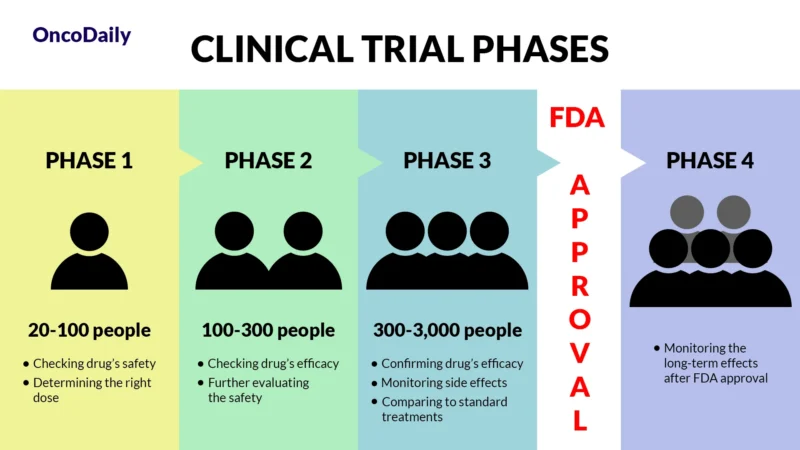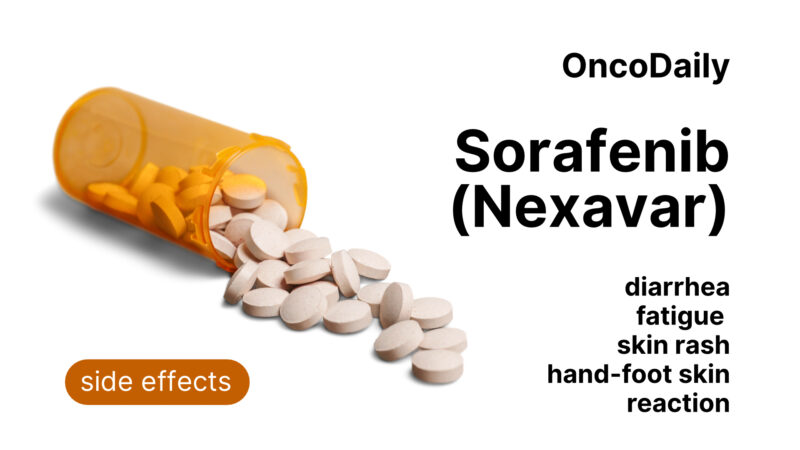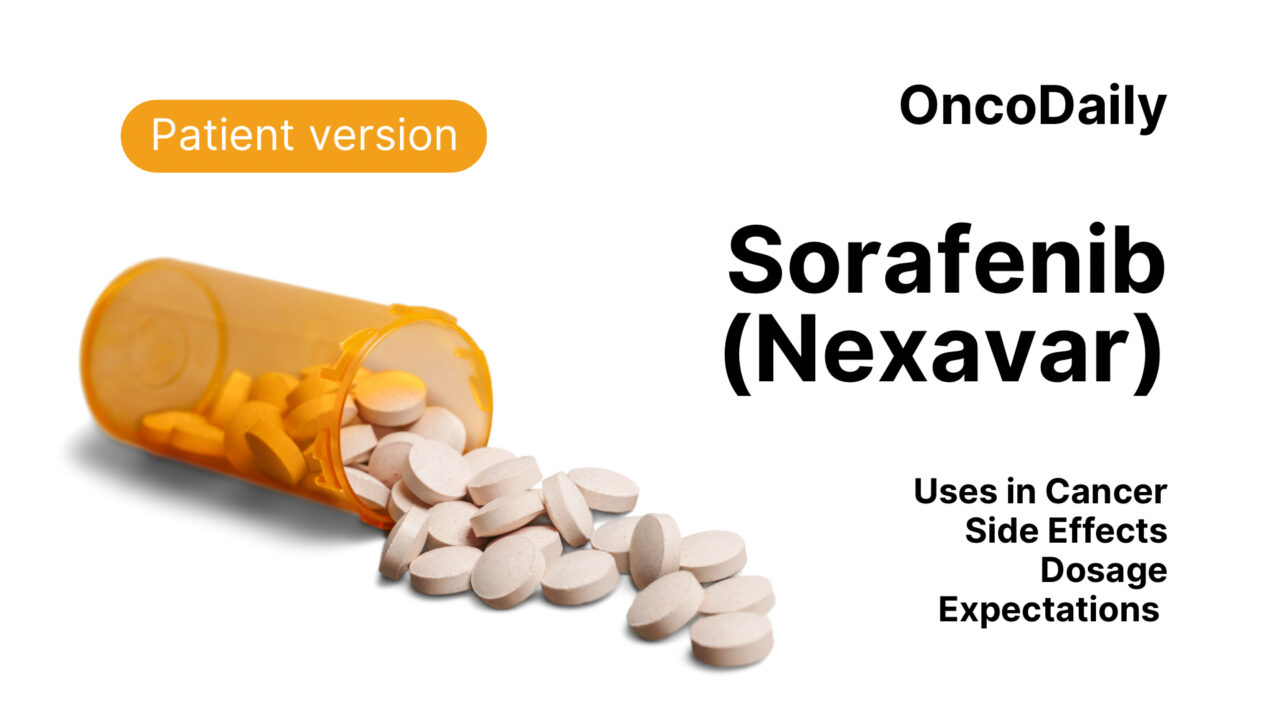Sorafenib is a targeted cancer treatment taken as a tablet. It has been approved by the U.S. Food and Drug Administration (FDA) for treating certain advanced cancers, including kidney cancer, liver cancer, and a type of thyroid cancer that no longer responds to radioactive iodine. Sorafenib belongs to a group of drugs called multikinase inhibitors, which work by slowing down the growth of cancer and cutting off the blood supply that tumors need to grow.
What Is Sorafenib and How Does It Work?
Sorafenib, sold under the brand name Nexavar, is a cancer treatment developed by Bayer. It works by blocking certain proteins called kinases, which help cancer cells grow and tumors form new blood vessels. Sorafenib targets several of these kinases at the same time—such as RAF kinases, which control cell growth; VEGFR and PDGFR, which help build and maintain blood vessels in tumors; and other proteins like RET and KIT, which are involved in different types of cancer. By interfering with these signals, sorafenib helps slow down or shrink the tumor and reduces its blood supply.
What Cancers Does Sorafenib Treat?
Sorafenib is officially approved to treat three types of cancer. The first is advanced renal cell carcinoma, a common form of kidney cancer, for which it was approved in 2005. The second is hepatocellular carcinoma, a type of liver cancer that cannot be removed with surgery, approved in 2007. The third is radioactive iodine-refractory differentiated thyroid cancer, a type of thyroid cancer that no longer responds to standard iodine treatment, approved in 2013. In all these cases, sorafenib is used when the cancer has spread or when surgery and standard treatments are no longer effective.
Efficacy and Results from Clinical Trials
Clinical trials have shown that sorafenib can help delay the progression of cancer and improve survival in some patients. In kidney cancer, a phase 3 study involving 903 patients showed that those taking sorafenib lived without disease progression for about 5.5 months, compared to 2.8 months for those taking a placebo.
The SHARP trial studied 602 patients with advanced liver cancer. Those who received sorafenib lived a median of 10.7 months, while those on placebo lived 7.9 months. Sorafenib also slowed tumor growth (5.5 months without worsening vs. 2.8 months on placebo). Common side effects included diarrhea, weight loss, hand-foot skin reaction, and low phosphate levels.
In the DECISION trial (2014), 417 patients with advanced thyroid cancer that no longer responded to radioactive iodine were treated. Sorafenib delayed cancer progression (10.8 vs. 5.8 months). Most side effects were mild to moderate, including skin rash, diarrhea, and hair thinning. These studies show that sorafenib offers real benefits in slowing cancer progression across several types of advanced cancer.

You can read more about Thyroid Cancer: Symptoms, Causes, Stages, Diagnosis on OncoDaily.
What Is a Clinical Trial and Why Does It Matter?
A clinical trial is a research study designed to test new drugs and treatments in patients to determine their safety and effectiveness. Before Nexavar was approved, it went through multiple phases of clinical trials to assess how well it worked, what side effects it caused, and whether it was better than existing treatments. Clinical trials are essential because they provide scientific evidence that a drug can help patients while ensuring it is safe for widespread use.

What Does FDA Approval Mean?
When a drug receives FDA approval, it means that after rigorous testing in clinical trials, it has been shown to be both safe and effective for treating a specific condition. This approval makes the drug widely available for doctors to prescribe and helps patients access new, cutting-edge treatments sooner.
How Is Sorafenib Given?
Sorafenib (Nexavar) is taken by mouth. It’s usually prescribed as two 200 mg tablets twice a day (400 mg total, taken morning and evening). For best results, it should be taken on an empty stomach—either 1 hour before or 2 hours after a meal. While on treatment, blood pressure should be checked regularly, since sorafenib can sometimes cause high blood pressure.
What Is the Recommended Dosage of Sorafenib?
Most patients start with 400 mg twice a day, but the dose may be lowered if side effects occur. Skin problems—such as rash or hand-foot syndrome—are the most common reason for dose changes. If these happen, doctors may reduce the dose or adjust how often it’s taken. For thyroid cancer, the dose might be lowered to 600 mg or even 200 mg a day depending on how severe the side effects are.
Patients with mild to moderate liver or kidney problems usually don’t need a dose change, but those with severe issues should be closely monitored, as less is known about safety in those cases. Adjusting the dose helps patients stay on treatment while managing side effects more comfortably.

You can read about Liver Cancer: What patients should know on OncoDaily.
Sorafenib Side Effects and Management
Nexavar works by blocking signals that help cancer cells grow and spread. While it can be effective in slowing cancer progression, like all medications, it may cause side effects. Understanding what to expect—and how to manage these effects—can help you stay as comfortable and healthy as possible during treatment.
Common Side Effects
The most frequent side effects include tiredness, diarrhea, skin rashes, thinning hair, high blood pressure, and a condition called hand-foot skin reaction. This causes redness, pain, or blisters on the palms and soles, which can affect walking or using your hands. Diarrhea and fatigue may make everyday tasks harder, but both can often be controlled with medication and rest. Skin issues are usually mild, and high blood pressure can be managed with regular checks and medication if needed.
Less Common but Serious Side Effects
Some patients may also feel nauseous, lose their appetite, or have joint pain and weight loss. These can affect nutrition and comfort but are typically treatable. Rarely, serious problems like liver issues, severe skin reactions, heart problems, or bleeding can occur. If you notice yellowing of the skin, chest pain, irregular heartbeat, or severe abdominal pain, contact your doctor right away.
Managing Side Effects
Doctors may adjust your dose or recommend a short treatment break to help with side effects. Using skin creams, staying hydrated, eating small meals, and getting enough rest can also help. Blood pressure should be monitored regularly, and blood tests help catch any hidden problems early. Keeping your care team informed about any new symptoms is the best way to stay safe and continue treatment effectively.

What to Expect Long-Term
Sorafenib does not cure cancer, but it can help keep it under control and improve quality of life for many patients. In real-world studies, patients with advanced liver cancer who received sorafenib lived an average of 8.5 months, although some patients had longer survival. Your doctor may adjust your dose based on how you respond and how well you tolerate the treatment. The goal is to balance effectiveness with quality of life, so staying in close contact with your care team is key.
What Should You Avoid During Treatment?
While taking sorafenib, you should avoid grapefruit, as it can interfere with how the drug is processed in your body. You should also stay away from certain strong medications like ketoconazole that affect liver enzymes. Avoid drinking alcohol, especially if you have liver issues. Live vaccines should not be used during treatment, and pregnancy or breastfeeding is not advised because the drug may harm the baby.
Real-Life Effectiveness
A U.S. study published in 2023 found that, in real-life settings, most patients with liver cancer who took sorafenib lived an average of 8.5 months. However, about 30 percent of patients had to stop the medication because of side effects. This highlights how important it is to carefully manage side effects and adjust the dose if needed.

Read more about Kidney Cancer: Symptoms ,Causes, Stages, Diagnosis and Treatment on OncoDaily.
Looking Ahead – The Future of Sorafenib
Researchers are actively studying how to expand the use of sorafenib. One focus is rare tumors like desmoid tumors and bone cancers in children and teens. Another area of interest is combining sorafenib with other cancer drugs, such as everolimus, to improve its effectiveness. Scientists are also paying closer attention to how sorafenib affects mental health and how individual dosing can be tailored to reduce side effects while still controlling the cancer.
What Other Trials Are Ongoing?
Research continues to explore new uses for sorafenib. A recent study called SORA-COG looked at how sorafenib affects memory and thinking in patients with desmoid tumors. It didn’t find major issues with cognitive function, although some patients reported higher anxiety levels. At the ESMO 2025 conference, researchers also presented promising early results of using sorafenib combined with another drug, everolimus, in children and teens with hard-to-treat bone cancers like osteosarcoma and Ewing’s sarcoma. Some side effects such as skin irritation and mouth sores were noted.
If you’re a healthcare provider, access the professional version here.


